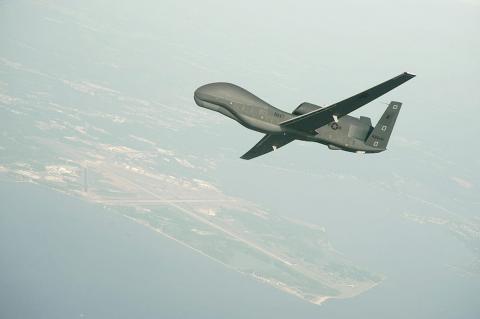The US will use its most advanced unmanned reconnaissance aircraft to monitor Chinese activity in waters surrounding the Diaoyutai Islands (釣魚台), the object of an acrimonious dispute between Beijing and Tokyo, Japanese media are reporting.
The decision was made during a meeting between Japanese Defense Minister Satoshi Morimoto and US Secretary of Defense Leon Panetta at the Pentagon on Sunday, NHK and the Yomiuri Shimbun said, adding that the drones would also conduct surveillance around Okinawa.
At least three unarmed Northrop Grumman RQ-4 Global Hawk drones have been deployed at Andersen Air Force Base on Guam since September 2010, bolstering the operational intelligence capabilities of US forces in the Asia-Pacific.

Photo: Reuters
Operating at an altitude of about 18,000m, the RQ-4 provides near-real-time, long-range intelligence, surveillance and reconnaissance imagery by means of a high-resolution synthetic aperture radar. It played a role in damage assessment following the disaster at Japan’s Fukushima Dai-ichi nuclear power plant in March last year.
Amid rising tensions between Japan and China over the disputed islets, the Japan Maritime Self-Defense Force has mostly relied on P-3C “Orion” surveillance aircraft to monitor Chinese naval activity in the area.
Taiwan also claims sovereignty over the islands.
Tetsuo Kotani, a fellow at The Japan Institute of International Affairs in Tokyo, said the deployment sends an important message.
“One of the urgent issues for the US-Japan alliance is to enhance intelligence, surveillance and reconnaissance [ISR] cooperation,” he told the Taipei Times yesterday. “The Global Hawk can serve as a symbol of allied ISR cooperation.”
“This is an important step for the alliance and sends a strong message to Beijing that Washington stands firmly with Tokyo,” he said.
Although the US does not officially take a position on the sovereignty dispute, some believe the Diaoyutais fall within the scope of Article 5 of the US-Japan Treaty of Mutual Co-operation and Security.
However, Kotani said Beijing should not misunderstand the real message.
“This is US reassurance to Japan. As long as Japan is reassured by the US, Japan does not have to take provocative actions vis-a-vis Beijing over the Senkakus,” he said. “No country wants to increase the tensions.”
The Diaoyutais are known as the Senkaku Islands in Japan.
During Sunday’s meeting, Panetta and Morimoto also agreed to explore eventual revisions of the Guidelines for Japan-US Defense Cooperation, which govern cooperation between the Japan Self-Defense Forces and the US military during crises.
Passed in 1978, the guidelines were substantially revised in 1997 in response to the North Korean nuclear program.
“We shared the view that it’s important to jointly study and discuss [security matters], taking into consideration changes in the security environment and what Japan-US cooperation should be,” Morimoto told a press conference.
According to the Yomiuri Shimbun, the review will focus on defense cooperation on the Nansei Islands in response to Chinese military expansion and increasing activity in waters surrounding Japan, as well as North Korea’s nuclear and missile development and post-disaster cooperation.
No specific procedures or timeline for the review were discussed.

Tropical Storm Gaemi strengthened into a typhoon at 2pm yesterday, and could make landfall in Yilan County tomorrow, the Central Weather Administration (CWA) said yesterday. The agency was scheduled to issue a sea warning at 11:30pm yesterday, and could issue a land warning later today. Gaemi was moving north-northwest at 4kph, carrying maximum sustained winds near its center of up to 118.8kph and gusts of 154.8kph. The circumference is forecast to reach eastern Taiwan tomorrow morning, with the center making landfall in Yilan County later that night before departing from the north coast, CWA weather forecaster Kuan Shin-ping (官欣平) said yesterday. Uncertainty remains and

SEA WARNING LIKELY: The storm, named Gaemi, could become a moderate typhoon on Wednesday or Thursday, with the Taipei City Government preparing for flooding A tropical depression east of the Philippines developed into a tropical storm named Gaemi at 2pm yesterday, and was moving toward eastern Taiwan, the Central Weather Administration (CWA) said. Gaemi could begin to affect Taiwan proper on Tuesday, lasting until Friday, and could develop into a moderate typhoon on Wednesday or Thursday, it said. A sea warning for Gaemi could be issued as early as Tuesday morning, it added. Gaemi, the third tropical storm in the Pacific Ocean this typhoon season, is projected to begin moving northwest today, and be closest to Taiwan on Wednesday or Thursday, the agency said. Today, there would likely

DISRUPTIONS: The high-speed rail is to operate as normal, while several airlines either canceled flights or announced early departures or late arrivals Schools and offices in 15 cities and counties are to be closed today due to Typhoon Gaemi, local governments announced last night. The 15 are: Taipei, New Taipei City, Taoyuan, Tainan, Keelung, Hsinchu and Kaohsiung, as well as Yilan, Hualien, Hsinchu, Miaoli, Chiayi, Pingtung, Penghu and Lienchiang counties. People should brace for torrential rainfall brought by the storm, with its center forecast to make landfall on the east coast between tonight and tomorrow morning, the Central Weather Administration (CWA) said. The agency issued a sea warning for the typhoon at 11:30pm on Monday, followed by a land warning at 11:30am yesterday. As of

CASUALTY: A 70-year-old woman was killed by a falling tree in Kaohsiung as the premier warned all government agencies to remain on high alert for the next 24 hours Schools and offices nationwide are to be closed for a second day today as Typhoon Gaemi crosses over the nation, bringing torrential rain and whipping winds. Gaemi was forecast to make landfall late last night. From Tuesday night, its outer band brought substantial rainfall and strong winds to the nation. As of 6:15pm last night, the typhoon’s center was 20km southeast of Hualien County, Central Weather Administration (CWA) data showed. It was moving at 19kph and had a radius of 250km. As of 3pm yesterday, one woman had died, while 58 people were injured, the Central Emergency Operation Center said. The 70-year-old